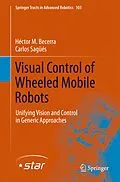Vision-based control of wheeled mobile robots is an interesting field of research from a scientific and even social point of view due to its potential
applicability. This book presents a formal treatment of some aspects of control theory applied to the problem of vision-based pose regulation of
wheeled mobile robots. In this problem, the robot has to reach a desired position and orientation, which are specified by a target image. It is faced in
such a way that vision and control are unified to achieve stability of the closed loop, a large region of convergence, without local minima, and good
robustness against parametric uncertainty. Three different control schemes that rely on monocular vision as unique
sensor are presented and evaluated experimentally. A common benefit of these approaches is that they are valid for imaging systems obeying approximately a central projection model, e.g.,
conventional cameras, catadioptric systems and some fisheye cameras. Thus, the presented control schemes are generic approaches. A minimum set of visual
measurements, integrated in adequate task functions, are taken from a geometric constraint imposed between corresponding image features. Particularly,
the epipolar geometry and the trifocal tensor are exploited since they can be used for generic scenes. A detailed experimental evaluation is presented for each
control scheme.
Inhalt
Introduction.- Robust visual control based on the epipolar geometry.- A robust control scheme based on the trifocal tensor.- Dynamic pose-estimation for visual control.- Conclusions.
